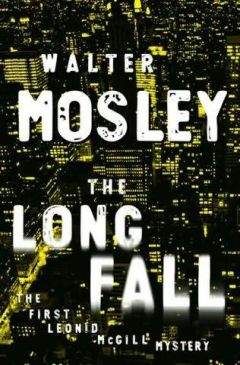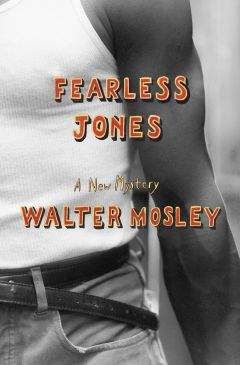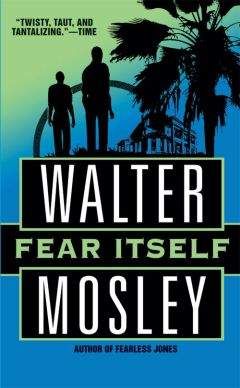Walter Mosley - The Long Fall
На электронном книжном портале my-library.info можно читать бесплатно книги онлайн без регистрации, в том числе Walter Mosley - The Long Fall. Жанр: Прочее издательство неизвестно, год 2004. В онлайн доступе вы получите полную версию книги с кратким содержанием для ознакомления, сможете читать аннотацию к книге (предисловие), увидеть рецензии тех, кто произведение уже прочитал и их экспертное мнение о прочитанном.
Кроме того, в библиотеке онлайн my-library.info вы найдете много новинок, которые заслуживают вашего внимания.

Walter Mosley - The Long Fall краткое содержание
The Long Fall читать онлайн бесплатно
He didn’t ask me what I meant. He just waited for the evidence to make itself known.
I was good but not on the level of Alphonse. I had made it all the way to his den, but I still had doubts.
“I don’t mean to rush you,” he said after maybe thirty seconds of my silent second thoughts, “but the attaché to the newly elected president of Russia is due to show up in nine minutes.”
He wasn’t bragging so much as showing me my place in the scheme of things.
“I need a pass to get into Larchmont State Prison, to get an hour alone with an inmate named William Nilson. His nickname is Toolie. And . . . ” I hesitated again. My old life was teeming around my ears, a swarm of killer bees casting a shadow and humming a dirge. “. . . and I want to know the whereabouts of a guy, a man, an accountant named A Mann.”
“Are you sure you want to find this man?”
“Yeah. Why? You know something?”
“You just seem a little doubtful.”
“Life is uncertain, isn’t it, Mr. Rinaldo?”
That got me a three-second smile.
“His first name?”
“The vowel.”
He reached under his desk and picked away at something. It took all of a minute. Then he stood up.
That was the drill. I stood up, too. I was supposed to leave then. As with Harris Vartan, it was important in Rinaldo’s ether that the people he dealt with picked up on the subtle nuances of his gestures. That’s why I was surprised when a quizzical expression crossed his face.
“What?” I asked.
“I was just thinking,” he said, sounding almost human.
“ ’Bout what?”
<û="1mandiv height="1em" width="1em" align="justify">“You and Christian are the only two black men, American-born black men, that have ever been in this office. Do you find that strange?”
“Only thing strange is that you realize it.”
He didn’t offer a hand and neither did I. I took the couple of dozen steps back the way I’d come and exited that particular conduit to hell.
Ê€„
31
By the time I’d reached Christian’s cell he had nearly everything I needed. Alphonse must have had a computer under his desk that he used to communicate with his living data engine. Christian was just finishing scribbling down A Mann’s pertinent information on the back of a pizza-delivery slip. These included a street address and a website that would be ready later that day.
“And the prison?” I asked after reading the address and dot-com-to-be.
“All you have to do is show up and tell them who you’re there to see.”
“Should I give them a name?” I asked. “A reference or something?”
His sneer was a thing to behold.
“Okay,” I said. “Thank you.” And I turned toward the door.
Christian did not wish me a good day.
THREE HOURS LATER I was out near Coney Island sitting in my green-and-white 1957 Pontiac across the street and down the block from a small wooden cottage on Murray Lane. I’d been there for twenty minutes, but that was okay by me. I liked it when I got time alone in my car, playing songs from my youth. I listened to everything from Gordon Lightfoot to B. B. King. Thanks to MP3 technology I could carry around my entire four-thousand-album collection in my shirt pocket.
I’d hired Twill to copy the collection two summers before, telling him I’d give him two dollars for every hour of music he recorded. That way I figured to keep him out of trouble when he wasn’t in school, while maybe getting a thousand or so records transposed in the process.
Three weeks after I hired him he came to me with the MP3 player, saying, “Here you go, Pops.”
I hadn’t seen him doing a thing. He was out day and night the whole time but there my records were, all of them, cross-referenced by genre, album, artist, and song name. He’d copied nearly forty thousand cuts in just over twenty-one days.
When I asked him how he did it he told me that he had a friend with five MP3-friendly turntables complete with mechanical stalks that could hold up to eight albums at a time.
“I just promised him two thousand to do the collection in three weeks,” Twill said, smiling.<þdiv/font>
It was a good deal, seeing that I owed my son six thousand.
Not having the cash on hand, I paid off his friend in installments over the summer and got Twill to agree to my starting a college account for him. I’m still depositing money on the first of each month, and listening to my favorite songs every day.
“Suppose I don’t want to go to college?” he argued when I first brought up the notion.
“You need to go,” I told him. “After that you could go into business and become a billionaire.”
“Not interested,” he replied, holding up a lazy hand intended to short-circuit the capitalist curse.
“Not now,” I said with fatherly assurance.
“Not never, Pops. Money makes people weak and stupid. And you know when you’re rich nobody ever likes you for you but for what you’re worth. I’d rather just make enough to do what I want and keep the electricity on.”
He was fourteen years old at the time. I promised him that if he didn’t want to go to college by the time he was twenty he could have whatever money was in the account.
“FAT MAN” BY Jethro Tull was playing on the Bose speakers I’d installed in the backseat. Twill wasn’t my son by blood but I would save him from himself. He deserved a better life, despite his intelligence and predilections.
As I sat there waiting for the prey to show itself, I turned my attention to Norman Fell.
I wondered what it was like to live a life when you couldn’t read a word. How strange the titles of books must seem; even your own name would only be familiar in a symbolic kind of way. To be a man like him out there hiding in plain sight, making a life for himself half swathed in internal darkness.
But literacy didn’t make you smart, just like, as Twill had already figured out, money didn’t make you rich.
Both Fell and I knew that finding those men was wrong, but we had bills to pay and shoes to replace, pretenses to keep up. Well after the properties had been condemned, we were still trying to build lives.
I used to believe that I was getting somewhere, that with enough experience and enough money in the bank I could become a well-heeled member of some exclusive club. I’d leave the street life to the mooks that lived it. I’d climb to the penthouse all the time knowing that the higher one gets . . .
I kept a storage space in the Bronx that had information on over three hundred cases that I had been involved in. I had once counted on those files to be my exit plan. I’d call everyone still alive and sell what I had for five thousand dollars a pop, on average. Or, if I got busted, I could use that information to deƒ€ormational myself out of a prison sentence.
But none of that mattered anymore. I was no longer a moral illiterate. I could read the signs and I knew what they meant.
“BLUE MOON” BY the Marcels was just ramping up on my system when a man came out the front of the yellow-and-blue cottage. A Mann. I knew his face from the temporary website Christian had provided. He was walking an elderly dachshund on a red shoulder leash. The old dog was pulling, halfheartedly, I thought, trying to get out and piss on the streets where he’d squandered his doggie youth.
The twelve-pound pet was a mottled brown, his master was pink and bulbous. If A Mann was thirty pounds overweight, forty of that was flab. He walked like a man who had never exercised a day in his life, a little wobbly on every fourth or fifth step. He wore jeans and a white T-shirt. This ensemble wasn’t very fashionable but that wasn’t saying much—Mr. Mann would have had to undergo a serious TV makeover to get him looking like he belonged anywhere.
On the other hand, he didn’t seem to care about appearances. A muttered to the dog and waited patiently for it to do its business. He was ready with a little plastic bag. It was painful, seeing him lowering to one knee on those weak and rusty pins.
When he was halfway down the block I got out and followed from the other side of the street.
We strolled in our separate worlds down toward the ocean. He was thinking about his dog and I was wondering how to make him my bitch.
With Christian’s help I knew that A had no wife or children. His mother lived with a sister in Tampa, and they had fallen completely out of touch. He’d changed his name to Dwight Timmerman and lived a very quiet life on a stipend garnered from a lifetime of careful investments. He lived in a kind of self-imposed, self-generated witness protection program.
Christian’s thoughtfully constructed website told me that A, when he realized that he was working for gangsters, had gone to a wealthy friend from high school who had made it rich. This friend, a man simply referred to by Christian as Mr. Jones, helped him change his identity. Jones had done all this with the help of one of Rinaldo’s subordinates.
Alphonse Rinaldo threw a broad web over the city of New York. Almost everyone was connected to him, though few knew it. His control over the city was so complete that he might have even pulled the strings of his own employers.
I had suspicions about Fell (aka Ambrose Thurman), but in the case of Tony the Suit there wasn’t a shadow of doubt: the moment I turned over Mann’s address, he and the dog would be dead. And if I refused to turn the name over, I’d be on Tony’s blacklist and someone else would root out the accountant.
The odds between me and Tony were pretty much even but if Harris Vartan decided to weigh in on the gangster’s side I wouldn’t make it a day.
I didn’t havƒ€">I didne much of a choice, and I had a family that needed me breathing in order for them to stay afloat.
THE STROLL LASTED for about thirty minutes. Mann and dog had to stop four times to catch their breath. One time there the accountant plopped down on a bench with his back toward the ocean. He was breathing through his mouth while the dachshund panted laboriously. The dog was looking up at A while he stared at the clouds. It was a moment of grace in an awkward life. I remember feeling a little jealous.
After that five-minute breather the duo lurched back to the cottage—probably to take an afternoon nap.
Ê€„
32
After leaving Coney Island I was at sixes and sevens, as my foster aunt Moth used to say. I didn’t want to set A up for a hit, but he was a dead man whether I did or didn’t. If I was still in the life I might have been able to turn Tony down; I’d’ve had other clients who could block his demands. But as it was, I had no protection. And I didn’t have much room to move in either; there was other pressing work that had to be done.
I dropped by Gordo’s Gym to work off some of the frustration.
Gordo gave me that grin again when I came through the door. He shifted his gaze to a lithe young fighter shadowboxing gracefully against the far wall.
Jimmy Punterelle was a handsome white kid with thick brown hair and a dark-blue tattoo of Rocky Marciano on his right shoulder. He was already stripped down and warmed up, so when Gordo introduced us it was the easiest thing in the world to suggest that we have a friendly sparring match. The kid sneered, then became a bit suspicious when Gordo told me that I wouldn’t need protective headgear.
Jimmy should have run.
He had a good jab and natural upper-body movement, but, despite my height, I have a long reach, especially when it comes to the ribs.
Jimmy lowered to one knee in the middle of our third round. It took everything I had not to hit him when he was down.
THE NEXT MORNING I drove up to the Larchmont Correctional Facility. Christian was right: I came to the admittance gate and was ushered in like royalty. They didn’t even search me.
After offering me really bad coffee, the two guards, whose names, TOMI and Peters, were stitched over their hearts, took me to a special floor in the infirmary.
“Why’s he here?” I asked the younger Tomi.
“Somebody stabbed him,” the white kid said. “You can hardly blame ’em. Nilson’s a fat fuck.”
Peters, a full-figured black man, grunted.
They didn’t ask why I was there. I was a VIP whom the warden’s betters had sent in for reasons of their own.
They had given Toolie a private room for the interrogation. Peters asked me if I needed someone to stay with us but I said no. Toolie had been stabbed, and even if he hadn’t I doubted that the four-hundred-plus-pound convict could have moved fast enough to give me reason to worry.
He was propped up in the double-sized cot with his bulging legs stretched out and his back leaned at an angle against the wall. His dress was festive: bright-yellow pajamas with a few dozen red X’s scattered around.
They had lashed two single beds together to accommodate the fat man’s size and weight. Toolie was like a big black walrus beached just that many feet too far from the sea. His breathing was labored and his bloodshot eyes suspicious. Toolie was bald and stuffed with fat everywhere: his hands and fingers, jowls and the back of his neck.
I wondered how a man could get so obese on prison fare.
He watched me as I came in, as I pulled a chair up next to his bed.
“Cigarette?” was my first question.
“Can’t smoke,” he said. “They got sick people all up in here.”
“They’ll make an exception in our case,” I said, proffering him the pack.
He took the whole thing. (That was how I gave up smoking for the sixth time.) I gave him a light.
“Who stabbed you?” I asked.
“What’s your name?” he parried.
“Greely. I work for a guy in the city. He needs to know something and thought maybe you could help.”
For some reason these words reassured the giant. In reply to my question he pulled open his yellow pajamas at the breast, showing me a thick bandage surrounded by puffy, bloodstained black skin.
“Mothahfuckah tried to kill me,” he said.
Похожие книги на "The Long Fall", Walter Mosley
Walter Mosley читать все книги автора по порядку
Walter Mosley - все книги автора в одном месте читать по порядку полные версии на сайте онлайн библиотеки My-Library.Info.



